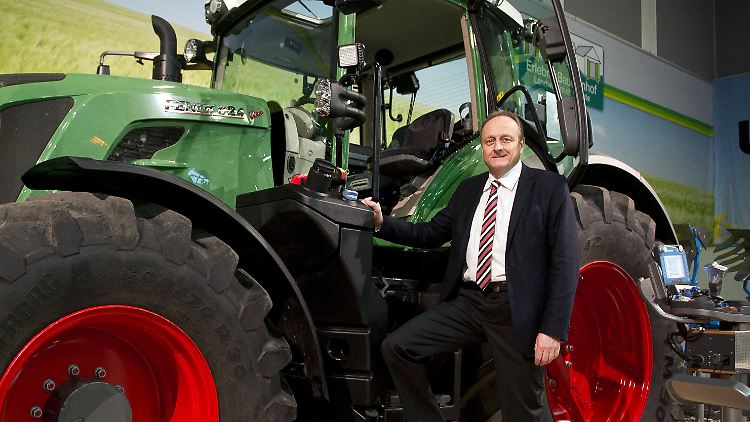Person of the week: Rukwied
Why farmers’ anger is justified
By Wolfram Weimer
January 9, 2024, 10:45 a.m
Listen to article
This audio version was artificially generated. More info | Send feedback
Germany is experiencing the largest farmers’ protests in decades. The traffic light is under pressure. Not only farmers’ president Joachim Rukwied and the opposition, but also the SPD prime ministers are calling for the additional burdens on farmers to be withdrawn. Because the dispute is only superficially about taxes.


The 62-year-old farmer Rukwied has been President of the German Farmers’ Association for more than eleven years – and is currently a powerful opponent of the traffic light.
(Photo: picture alliance / dpa)
The farmers’ protests are not just spectacular. They also put the traffic light government in trouble. Last week, the coalition hastily reversed parts of the planned tax increases for farmers. But that won’t be enough. The protests are finding unexpected resonance and the traffic light policy is facing a breaking point. After the CDU and CSU, the SPD prime ministers have also been on the side of the farmers and against the traffic lights since Monday. Lower Saxony’s influential head of government, Stephan Weil, makes an “urgent recommendation to the federal government to come clean.” In the ZDF morning magazine, Weil calls on his own party colleague and Chancellor: “I think it would be good if this conflict were ended.”
In political Berlin, further concessions to the farmers are therefore expected. This is not just due to the underestimated extent of the protests. There are three deeper political reasons for admitting the traffic light was wrong.
First The planned tax increases for farmers are one-sided and disproportionate. In its Christmas budget crisis, the traffic light made a hasty decision to ask German farmers to pay particularly hard. The tax increases decided in December would have meant additional taxes of 3,000 to 6,000 euros per year for an average farming family. In most cases, however, this corresponds to an average monthly salary, which suddenly has to be paid to the state and is therefore simply eliminated from the family budget. Even Agriculture Minister Cem Özdemir speaks of a socially unjust, “disproportionate burden”. No other population group would have their entire monthly salary suddenly taken away. The wave of protests therefore also affects a larger emotional range of the rural population as a whole. The SPD prime ministers in their regional states are feeling this and are now, together with the opposition, resisting the traffic light policy. The worry behind it: now also losing the farming families to the AfD.
Easy pawn sacrifices
Secondly The decisions seem arbitrary and like client punishment. Since the overwhelming majority of farmers traditionally do not vote for traffic light parties, their one-sided special burden has the effect of political punishment for those who think differently. In terms of power politics, the traffic light apparently seemed to have the lowest risk of losing its own voters. But in terms of state policy, this partisanship undermines the integrity of government actions. The disturbed relationship between the Greens and the German peasantry is a party’s special problem. Agriculture Minister Cem Özdemir is currently navigating unhappily and is likely to see his chances of becoming the next Prime Minister of Baden-Württemberg diminish with this farmers’ conflict. But if federal politics as a whole follows party-political clientele considerations, then it damages the sense of justice and the political culture of the Federal Republic. That’s why the resonance of this farmers’ protest extends far beyond tractor drivers.
Third The unilateral tax increases destroy trust in the politics of central reason. If German farmers are put at such a disadvantage compared to their international competition, especially France and Poland, this will lead to an accelerated die-off of farms in this country and a shift in food production abroad. This cannot be in Germany’s interest, and it is also harmful in terms of climate policy, because food will then no longer be produced regionally but will trigger significant transport emissions.
This reinforces the impression among the population that current politicians say something different than what they actually mean. The traffic light says it is about “reducing climate-damaging subsidies”. In reality, however, it urgently needs fresh money and is unable to finally save money – for example on the controversial, billion-dollar climate development funds.
Dangerous linguistic maneuvers
The distortion of language then serves a propaganda purpose. Because it is by no means a question of subsidies if farmers currently pay 25 cents in taxes on a liter of agricultural diesel, but in the future it will be 47 cents. Both are taxes, one moderate and the other extremely extreme. The traffic light tries to create political acceptance through subsidy wording – but at the price of distorting reality. Subsidies are government aid, while moderate taxes are not subsidies, but still taxes. The fact that the benchmarking of extreme taxes is being defined as a new normal and anything below that is suddenly called a subsidy is not just a concern for farmers. Because then normal income taxes would suddenly be subsidies, even though everyone could pay maximum taxes. The language betrays a financial policy that has fallen into disarray. If special funds are actually debts and subsidies are really taxes, then a government is undermining its basic trust.
The farmers’ president Joachim Rukwied therefore speaks of a tipping point in credibility, and he gets to the heart of the collective mood. The farmers’ protest exposes a deeper, widespread unease with a lurching, disintegrative traffic light policy that is gradually causing Germany to sink. The republic is heading uncertainly towards European and East German state elections, and the polls are already signaling a political earthquake. The chances of extremist parties are higher than ever before. The political center is eroding – and the farmers’ protest therefore acts as a signal for the year 2024. From the migration to the industrial location to the budget crisis, the republic’s central problems are currently not being solved properly. In Berlin, the worrying saying is already circulating in both popular parties: “If the political center doesn’t solve the problems, then the problems will dissolve the political center.”
Recognition advocate
Rukwied and his farmers are therefore viewed as if through a political magnifying glass. Personally, despite all the drama, he is anything but an extremist. He loudly and clearly criticizes the blockade of the farmers’ mob in the port of Schlüttsiel. He describes the action, in which Vice Chancellor Robert Habeck was unable to leave his ferry, as a “no-go”. “Personal attacks, insults, threats, coercion or violence are not acceptable,” warns Rukwied.
As president of the German Farmers’ Association (DBV), Rukwied has represented around 300,000 agricultural businesses, mostly down-to-earth farming families, for eleven years. He comes from one of these himself. His parents ran a family farm in Eberstadt near Heilbronn, which he took over in 1994 – in the eighth generation. Rukwied is married, has three children, initially helped other farmers in advisory offices, then became involved with the CDU in the local council of Eberstadtwas deputy mayor of the small community with around 3,000 residents.
Rukwied knows the base and is considered a resolute but ultimately conciliatory representative of the interests of his peasantry. For him it’s not just about money, but also about respect. German politicians have been pursuing a stinging policy against farmers for years with ever new requirements, bans and criticism. In green-left milieus, farmers are defamed as animal-torturing nuisances and subsidy parasites, farmers complain. “Enough!” is Rukwied’s slogan. The association is calling for the cuts plans to be completely withdrawn “without ifs and buts”. Otherwise, more and more farmers will be driven to ruin. Already today, an average of seven farms in Germany have to close every day. The situation is serious.
